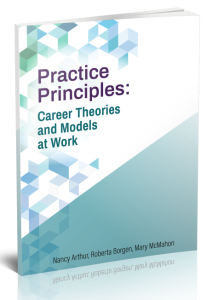|
Getting your Trinity Audio player ready...
|
At the end of each of the 43 chapters in the book Career Theories and Models at Work: Ideas for Practice, authors provided a page of practice points. What can we learn from those practice points to inform and strengthen theory-practice connections? The results of an in-depth analysis are presented in the newly released, CERIC-funded book Practice Principles: Career Theories and Models at Work.
One of the eight practice principles emphasizes that career development practice occurs in cultural contexts. This blog will explore why, regardless of your theoretical orientation or roles as a career development practitioner, it is important to consider the unique contexts of the clients you serve and approaches you can use to contextualize career development practice.
Culture and context permeate how we approach career development practice in multiple ways. For example, consider the resources that you use in your practice, including theories, models and assessment tools. What are the origins of these resources? How well do these resources apply to your personal context?
There are longstanding concerns about the domination of Western theories written for middle-class, male and white populations. Arguably, people do not all have the same experiences, especially when we consider contextual influences such as gender, racialization, ability, social class and their intersections. Some theories and models have been tested across country contexts and some theorists have addressed concepts such as privilege and oppression, decent work and structural influences in the labour market that influence people’s work and livelihoods.
 Similarly, you might want to review assessment and intervention tools. What are their origins and how do you link them to the theories and models that you use in practice? You could initiate discussions with colleagues, instructors or supervisors about the applications of resources across cultural contexts and share approaches for customizing resources.
Similarly, you might want to review assessment and intervention tools. What are their origins and how do you link them to the theories and models that you use in practice? You could initiate discussions with colleagues, instructors or supervisors about the applications of resources across cultural contexts and share approaches for customizing resources.
In contextualized career development practice, how do you acknowledge peoples’ diversity and strengths? You might reflect on your reaction to the introduction of a practice principle that emphasizes the cultural contexts of people’s lives. Who did you think about? Our interactions with other people include many similarities and differences, on a continuum. For example, when you reflect about other people who have a similar background to your own, are your life experiences and attitudes identical? Do you practise the same degree of active listening when people appear to have similar or different backgrounds in comparison to your life experience? Assessing the influences of cultural context matters for working with all clients!
Each person has a unique worldview that is like a lens for filtering information about themselves, other people and the world around them. You might reflect about your own experiences and views about work, career progression or preferred occupational pathways. Our clients’ values and beliefs have been shaped through messages from their friends, family, community members and/or through their exposure to media. How do you react when clients express similar or contrasting ideas? How flexible is your approach to career planning and decision-making? Clients may benefit from hearing new and contrasting perspectives to help them gain insights about constraints, opportunities and future possibilities. But remember, it is important to empower clients to pursue options within the cultural contexts of their lives.
“Each person has a unique worldview that is like a lens for filtering information about themselves, other people and the world around them.”
Cultural contexts also relate to the institutions and organizations where people gain their education and employment experiences. What spoken and unspoken rules have you noticed in the organizations where you have been employed? Through initiating career conversations about workplace culture, you can invite clients to take a collaborative approach – with you and/or with significant people in their lives – to address issues related to job performance or navigating workplace relationships. You might use a values-based approach to support clients to explore the meaning of work and to thrive within challenging workplace cultures.
There are many ways that career issues are connected to the opportunities and constraints that people experience in their places of employment or as they transition between jobs. Many people spend a large portion of their lives at their workplaces. Your support in navigating the cultural contexts of organizations can help people to better manage their roles, use their capabilities and determine areas for new skill development.







Dr. Nancy Arthur's focus on culture, in terms of relevant career counselling speaks to me of the importance of a person's values, interests, lifestyle and a few other elements that are necessary in the initial and ongoing considerations of career choices and goals. This involves the centre of meaning for the person; a starting point as well as a foundation.